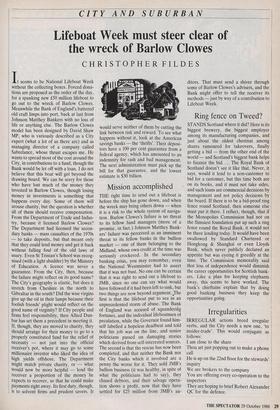CITY AND SUBURBAN
Lifeboat Week must steer clear of the wreck of Barlow Clowes
CHRISTOPHER FILDES
It seems to be National Lifeboat Week without the collecting boxes. Forced dona- tions are proposed as the order of the day, for a spanking new £50 million lifeboat to go out to the wreck of Barlow Clowes. Meanwhile the Bank of England's battered old craft limps into port, back at last from Johnson Matthey Bankers with no loss of life or anything else. The Barlow Clowes model has been designed by David Shaw MP, who is variously described as a City expert (what a lot of us there are) and as managing director of a company called Sabrelance, whose thrust escapes me. He wants to spread most of the cost around the City, in contributions to a fund, though the Bank would be let off with a loan. I do not believe that this boat will get beyond the drawing board. We can be sorry for those who have lost much of the money they invested in Barlow Clowes, though losing money in investments is something that happens every day. Some of them will arouse charity, but the question is whether all of them should receive compensation. From the Department of Trade and Indus- try, because it licensed Barlow Clowes? The Department had licensed the secon- dary banks — mass casualties of the 1970s — to take deposits, but that meant only that they could lend money and get it back without falling foul of the old laws of usury. Even St Trinian's School was recog- nised (with a light shudder) by the Ministry of Education. A licence was never a guarantee. From the City, then, because the failure might reflect on its good name? The City's geography is elastic, but does it stretch from Cheshire in the north to Gibraltar in the south? Did the wise virgins give up the oil in their lamps because their foolish friends' plight would reflect on the good name of virginity? If City people and firms feel responsibility, then Allied Dun- bar has set them a precedent in meeting it. If, though, they are moved to charity, they should arrange for their money to go to a properly constituted fund for the relief of necessity — not just into the official receiver's pot, where it may go to some millionaire investor who liked the idea of high yields offshore. The Department might match private charity, or — what would now be more helpful — lend the receiver a proportion of the money he expects to recover, so that he could make payments right away. Its first duty, though, is to solvent firms and prudent savers. It
would serve neither of them by cutting the link between risk and reward. To see what happens without it, look at the American savings banks — the 'thrifts'. Their deposi- tors have a 100 per cent guarantee from a federal agency, which has amounted to an indemnity for rash and bad management. The next administration must pick up the bill for that guarantee, and the lowest estimate is $30 billion.


























































 Previous page
Previous page